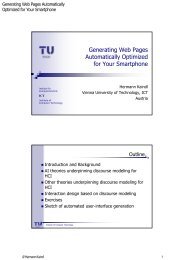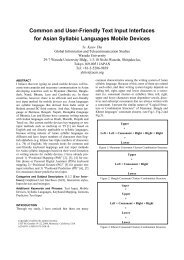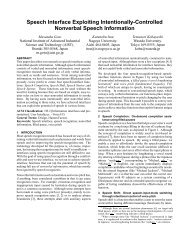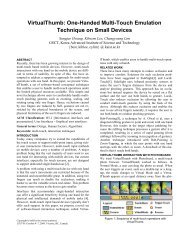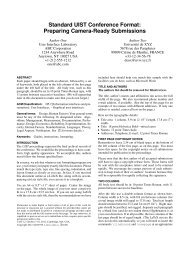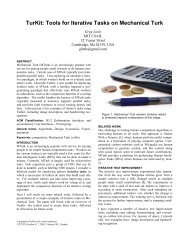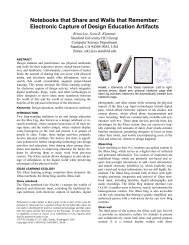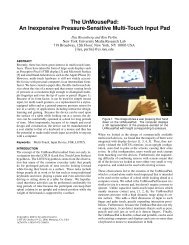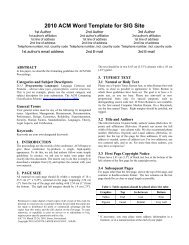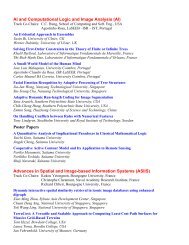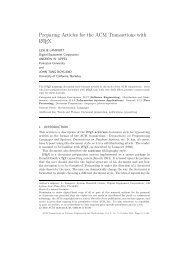API Design Matters Stonebraker and Seltzer - RabbitMQ
API Design Matters Stonebraker and Seltzer - RabbitMQ
API Design Matters Stonebraker and Seltzer - RabbitMQ
Create successful ePaper yourself
Turn your PDF publications into a flip-book with our unique Google optimized e-Paper software.
let’s talk about that side of the world, where the elephants<br />
may be elephants, but they’re not st<strong>and</strong>ing still. Can you<br />
really compete with the elephants in the long term? Are<br />
the elephants simply going to get smart <strong>and</strong> say, “OK, our<br />
big engine doesn’t do this; so we’ll build a little engine<br />
that does.” Right? They’ve got lots of programmers.<br />
STONEBRAKER I think of things in a much more holistic<br />
fashion. At least in the database world, the large ven-<br />
dors move quite slowly. So it seems the way technology<br />
transfer happens is that the<br />
elephants just don’t do new<br />
ideas. They wait for startups<br />
to prove that they work. The<br />
good ideas go into startups<br />
first. Then the elephants pick<br />
<strong>and</strong> choose from them.<br />
SELTZER So the startups are<br />
necessary for innovation,<br />
because the elephants can’t<br />
innovate—is that really the<br />
answer?<br />
STONEBRAKER I think so.<br />
SELTZER Let’s draw a<br />
distinction between emerg-<br />
ing technology <strong>and</strong> disrup-<br />
tive technology. Emerging<br />
technology is anything that’s<br />
new <strong>and</strong> may be different<br />
from the old stuff. Disruptive<br />
technology is an emerging<br />
technology that ultimately<br />
replaces the old technology.<br />
My question is whether these<br />
new database verticals that<br />
you’ve identified are emerg-<br />
ing or disruptive?<br />
STONEBRAKER Well, the<br />
elephants never had the text market, so that is simply<br />
somebody else’s stuff.<br />
Right now the elephants own the warehouse market,<br />
but they’re selling the wrong technology, <strong>and</strong> it’s not<br />
obvious how to morph from old to new. I think that will<br />
be very disruptive.<br />
Stream processing is largely a new application. That’s<br />
simply a green field that didn’t exist 20 years ago, <strong>and</strong><br />
now it does.<br />
And I think if I’m successful in building an OLTP<br />
engine that’s faster by a factor of 30, that would be very<br />
disruptive.<br />
SELTZER Let’s talk about how that disruption can occur,<br />
more queue: www.acmqueue.com<br />
given that some people think that nobody actually buys<br />
databases anymore; people just buy applications. In order<br />
to truly disrupt, you’ve got to win the applications. How<br />
does a tiny startup do that?<br />
STONEBRAKER It’s clearest in the data warehouse space,<br />
where it turns out that Teradata is doing very well. There’s<br />
a startup in Framingham, called Netezza, that’s doing<br />
very well, too. It’s selling proprietary hardware, which no<br />
one on the planet wants from the get-go, but it’s very suc-<br />
transition to manage.<br />
cessful. Why would anybody<br />
buy lock-ins <strong>and</strong> proprietary<br />
hardware? The answer is,<br />
you have to be in consider-<br />
able pain.<br />
In the data warehouse<br />
market, people are in tre-<br />
mendous pain. There are<br />
several ways to talk about<br />
this pain. One way is ad hoc<br />
queries on data warehouses.<br />
The complexity of queries<br />
tends to go up at about the<br />
square of the database size.<br />
So, if you have a small ware-<br />
house, you’re perfectly okay<br />
on Wintel <strong>and</strong> SQL Server.<br />
But then, if you run out<br />
of gas on SQL Server, which<br />
doesn’t scale anymore,<br />
you’re facing a discon-<br />
tinuous forklift upgrade to<br />
something like, say, Sun<br />
Solaris <strong>and</strong> Oracle. That’s<br />
different hardware, a differ-<br />
ent database, <strong>and</strong> a different<br />
operating system. In short, a<br />
forklift upgrade—a horrible<br />
If you’re staring at this wall, <strong>and</strong> the solution is a fork-<br />
lift upgrade, then you’re in real pain.<br />
Similarly, Oracle has scalability problems that limit its<br />
ability to scale in the multi-terabyte range. What usually<br />
happens is that people who have a terabyte-size ware-<br />
house that is growing are looking at the same kind of<br />
wall, <strong>and</strong> they are forced to go to something like Netezza<br />
or Teradata.<br />
If you’re looking at any one of these walls, you’re<br />
faced with great pain in moving to the other side. And if<br />
you’re in this kind of pain, it means you’re willing to take<br />
a g<strong>and</strong>er at new technology.<br />
ACM QUEUE May/June 2007 21



